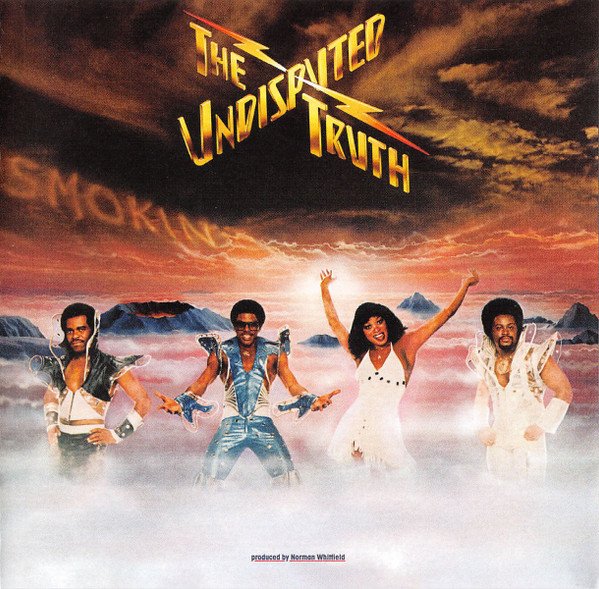CATALOG CRAWL: THE UNDISPUTED TRUTH, Part 3 (1976-1981 - including DREAM MACHINE)
Norman Whitfield was known for creatively dominating the acts he produced, particularly in how he tended to write most of the material, but he was loyal to the groups who could roll with his approach. Thus, when he left Motown to start his own vanity label at Warner Brothers, it was no surprise that he took his pet project The Undisputed Truth with him. As always, the lineup of singers frequently shifted, with Joe Harris being the one reliable constant, but they'd rack up another two long players with Whitfield.
\Those two albums are covered below in this final installment of Catalog Crawl for The Undisputed Truth. Both show the group retaining a trace of the funk-rock freakiness from the end of their Motown era as they broaden their focus to tackle other strains of commercial soul music that became prominent in the second half of the '70s. This coverage also includes the lone album by Dream Machine, another Whitfield-produced venture that is essentially a stealth reboot for the group on the RCA label. Though only one hit emerged from this trio of albums, they're full of creative and engaging grooves for '70s soul fanatics.
Members: Joe Harris (vocals), Taka Boom (vocals/album 1 & 3), Tyrone "Lil' Ty" Barkley (vocals/album 1), Calvin "Dhaakk" Stevenson (vocals/album 1), Lloyd Williams (vocals/album 2 & 3), Marcy Thomas (vocals/album 2), Melvin Stewart (vocals/album 2 & 3)
METHOD TO THE MADNESS (1976): the group's first album for Warner Brothers returns to the 'various styles' R&B approach of their early work. The freaky funk contingent that dominated the last two albums is confined to a George Clinton-style spoken word intro and some slight acid rock touches on the title track, a horn-driven number with chant vocals over a thumb-poppin' bassline. You also get some traditionally plush ballads, including a redux of "Life Ain't So Easy" with a more orchestrated style and an elegant love lament called "Sunshine." However, the big news is the shift into disco: "You + Me = Love" became a dancefloor smash, offsetting its metronomic groove with all of Whitfield's tricks (soaring strings and horns, extended solos and intense, gospel-tinged backing vocals), and "Let's Go To The Disco" offsets its formulaic lyrical scenario with a heavy shot of funk, including another relentlessly grooving bassline. New female vocalist Boom adds a gospel grit to complement Harris's similar style and the result is a solid platter that covers all the soul music bases circa 1976.
SMOKIN' (1979): on the final album of their original run, the Undisputed Truth sounds like the slightly rebellious, rock-tinged older sibling to labelmates Rose Royce. Whitfield's production is as slick as the late '70s required but he still allows the group to fly its freak flag here and there: note how the elegant yet intense balladry of "Talkin' To The Wind" brings in fuzz guitar and heavy bass to underscore its emotional peaks and how album closer "Misunderstood" starts as a Rose Royce-ish ballad but gives way to a joyful, gospel-tinged Graham Central Station-inspired rave-up in its second half. Elsewhere, "Atomic Funk" and "Showtime" have an insistent funkiness and "Cosmic Monster" brings back the UFO-themed eccentricity of old but they have a laid back quality to their tempos and arrangements that gives them an unexpected, engaging mellowness. The resulting album has a chilled-out vibe that makes it a perfect late-night listen. Unexpected surprise: "Sandman," a tune penned by sometime Rose Royce songsmith Miles Gregory, that adds a dash of breezy yacht-soul jazziness to the proceedings.
DREAM MACHINE - S/T (1981): This is basically a rebranded version of the Undisputed Truth, reuniting Whitfield with members of the last few Truth lineups (including the stalwart Harris) and other musicians from the Truth/Rose Royce axis. RCA abandoned the band after this debut and that's a shame because everything here has substance, benefiting from smooth vocals and typically plush Whitfield production. It shows the producer and his recruits making a credible venture into '80s soul on tunes like the Star Wars-referencing "The Force" and the band anthem title track, which feels like a Rose Royce groove given an electro-funk facelift. The dance-oriented material is offset by creamy ballads like "Don't Walk Away" and "All My Love," the one tune here with traditional orchestral soul touches. The most unique of the ballads is "Simple Love Song," a romantic lament with a unique musician's point of view in the lyrics and an interesting arrangement that offsets its layers of keyboard with acoustic guitar. Fans of the Undisputed Truth are encouraged to track down this disguised coda to their career.





